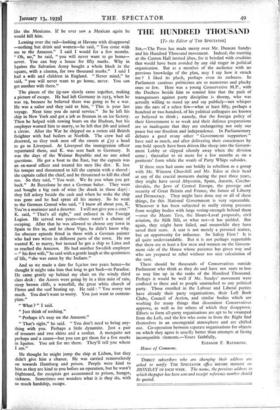THE HUNDRED THOUSAND
[To the Editor of THE SPECTATOR] SIR,—The Press has made merry over Mr. Duncan Sandys and his Hundred Thousand movement. Indeed, the meeting at the Caxton Hall invited jibes, for it bristled with crudities that would have been avoided by any old stager in political organisation. But as a member of the audience with no previous knowledge of the plan, may I say how it struck me ? I liked its pluck, perhaps even its rashness. In Parliament cautious politicians are so numerous and plucky ones so few. Here was a young Conservative M.P., with the Duchess beside him to remind him that the path of transgressors against party discipline is thorny, who was actually willing to stand up and say publicly—not whisper into the ears of a select few—what at least fifty, perhaps a hundred or two hundred, of his political colleagues are known or believed to think ; namely, that the foreign policy of their Government is so weak and their defence preparations are so inadequate that they are endangering not only our peace but our freedom and independence. In Parliamentary debates a good many other " Government supporters " have said as much, and after delivering their consciences by one bold speech have been driven like sheep into the Govern- ment Lobby or slipped silently away when the division came ; thereafter to sit mute for a few months as on a penitents' form while the wrath of Party Whips subsides.
If these men had come out boldly in rebellion as a group with Mr. Winston Churchill and Mr. Eden at their head at any of the crucial moments during the past three years, they might have saved Abyssinia, Spain, Austria, Czecho- slovakia, the Jews of Central Europe, the prestige and security of Great Britain and France, the future of Liberty and Democracy. They might have done any or all of these things, for this National Government is very squeezable. Whenever it has been subjected to really strong pressure from weighty bodies with large voting-strength behind them —over the Means Test, the Hoare-Laval proposals, civil aviation, the Milk Bill, or what not—it has yielded. But again, they might have failed, and meanwhile they have saved their seats. A seat is not merely a personal matter, but an opportunity for influence. So Safety First ! It is all quite understandable. But it is not perhaps regrettable that there are at least a few men and women on the Govern- ment side of the House whose patience has given way and who are prepared to rebel without too nice calculation of the cost.
There should be thousands of Conservatives outside Parliament who think as they do and have not seats to lose so may line up in the ranks of the Hundred Thousand. Perhaps it would be well if Mr. Sandys' movement were confined to these and to people unattached to any political party. Those enrolled in the Labour and Liberal parties have already their patty organisations, their Left Book Clubs, Council of Action, and similar bodies which are working for many things that dissentient Conservatives approve, as well as for others of which they disapprove. Efforts to form all-party organisations are apt to be swamped from the Left, and the few who come in from the Right find themselves in an uncongenial atmosphere and are chilled out. Co-operation between stparate organisations for objects on which they agree is usually better than attempts at fusing incompatible elements.—Yours faithfully,






































 Previous page
Previous page